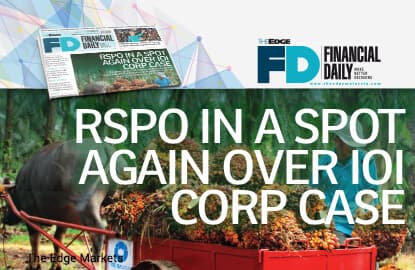
KUALA LUMPUR: The Roundtable on Sustainable Palm Oil (RSPO) has found itself in a difficult position again over the case involving the suspension and reinstatement of the certification of sustainable palm oil for IOI Corp Bhd. This time, a non-governmental organisation (NGO) is unhappy and threatening to quit the self-regulating body established to promote the growth and use of certified sustainable palm oil.
This came just a day before its 14th Annual Roundtable Conference on Sustainable Oil, a congregation of plantation corporations, NGOs and consumer companies to be held in Bangkok, Thailand.
According to a Reuters report yesterday, sustainability consultants Aidenviroment Asia could become the latest NGO to cut ties with the RSPO, over what it calls poor handling of a complaint against major palm oil producer IOI Corp.
Reuters quoted Eric Wakker, who is a senior consultant at Aidenvironment, as saying that he wanted the RSPO to publicly admit it had made “serious mistakes” with the IOI Corp case, and that if the watchdog did not seriously come up with a real commitment to change, then Aidenvironment would “throw in its RSPO membership”.
Wakker could not be reached for comment.
RSPO global outreach and engagement director Stefano Savi was also quoted by Reuters as saying that the organisation was focused on its processes and was not going to make decisions based on sentiment.
Savi also said that the number of NGOs that continued or started supporting the RSPO in the past year was far greater than the number of those who had disengaged from the process.
An analyst with a bank-backed research house covering the sector commented that it was certainly not the best of times for the RSPO, and the organisation might need to even take an unpopular decision.
“If the RSPO sways towards the NGOs, they risk losing the planters. My guess is they will let the NGOs exit,” said the analyst.
IOI Corp, one of the founding members of the RSPO, announced in late March this year that its RSPO certification for its entire oil palm production would be suspended from April, following complaints of violation of RSPO criteria by NGOs against the plantation estates of IOI Corp’s Indonesian subsidiaries.
The announcement came after Aidenvironment submitted a formal complaint to the RSPO in that same month, alleging deforestation in IOI concessions in Ketapang, among others.
Following the suspension, major multinational brands such as Unilever, Kellogg’s, Colgate-Palmolive, Johnson & Johnson, Procter & Gamble, SC Johnson, Yum! Brands and Nestle announced that they would stop sourcing for palm oil from IOI Corp.
This led IOI Corp to initiate legal action against the RSPO, due to commercial and reputational losses suffered.
However, in a turn of events, the RSPO in August lifted the suspension, having been satisfied that IOI Corp had met the conditions set out by the RSPO in its letter to the plantation giant dated March 14.
If Aidenvironment decides to leave the RSPO as a result of IOI’s reinstatement, it will not be the first NGO to break ties with the organisation over an incident involving the Malaysian plantation giant.
In 2014, Penang-based regional advocacy group Pesticide Action Network Asia and the Pacific (PAN AP) — a member since 2005 — parted ways with the RSPO due to an alleged breach of RSPO requirements on a land conflict between IOI Corp and an indigenous community in Sarawak.
“We parted ways with the RSPO in 2014 due to the land issue involving IOI and Long Teran Kanan, an indigenous community in Sarawak; we felt that the RSPO’s processes were not followed by IOI Corp, and there was [no prompt action] being taken by the RSPO.
“Another reason PAN AP parted ways with the RSPO was over the issue of the usage of paraquat in oil palm plantations, as we are advocating the ban on the usage of paraquat globally, and there was a lack of commitment from the RSPO on this matter,” PAN AP executive director Sarojeni Rengam told The Edge Financial Daily.
According to Reuters, Australian NGO Palm Oil Investigations, which is not an RSPO member, has stopped encouraging consumer companies to seek RSPO certification, after the reversal on IOI Corp, while Swiss-based NGO PanEco resigned as an RSPO member in June, citing failures in its complaints panel, monitoring and audit process.